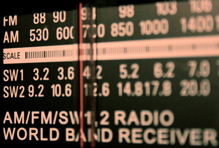 Many thanks to Any Sennitt who shares a link to this article by Telegraph journalist, Colin Freeman.
Many thanks to Any Sennitt who shares a link to this article by Telegraph journalist, Colin Freeman.
(Source: The Telegraph via Andy Sennitt)
Along with the glaciers of the Arctic and the sand dunes of the Sahara, northern Somalia is one of the loneliest, most godforsaken places I’ve ever visited as a foreign correspondent. You can wander its Arizona-like landscape for days without seeing another soul, and when I was held hostage there in 2008, I could see why so many British troops posted to Somalia after the Second World War committed suicide through loneliness.
That I did not succumb to the same urge is thanks to many factors – one being the good cheer of the photographer held captive alongside me, another being the Telegraph’s heroic efforts in securing our release.
But during the six weeks we spent held at gunpoint in a cave, one thing that stemmed the despair was the tiny, battery-operated radio that our kidnappers sometimes lent us. On the short wave channel we could get a faint BBC World Service signal, and while it was often fuzzy as it bounced round the cave’s walls, it was better than yet another game on our chess set made from cigarette foil.
So I’m pleased to hear that this lifeline is now being extended to inmates of another, much larger prison – the 25 million citizens of North Korea, who are denied access to any outside media by their leader, Kim Jong-un. As the Telegraph disclosed on Thursday, the World Service is to plan a new North Korea channel, giving the country’s brain-washed citizens a much-needed alternative to the relentless propaganda of the world’s last Stalinist regime.
